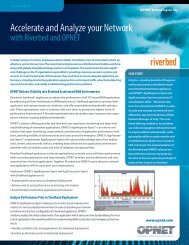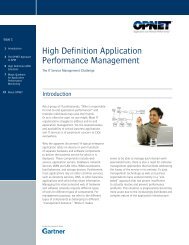Create successful ePaper yourself
Turn your PDF publications into a flip-book with our unique Google optimized e-Paper software.
OPNET Technologies, Inc. <strong>2011</strong> <strong>Annual</strong> <strong>Report</strong><br />
QUantitatiVe anD QUalitatiVe DiSclOSUReS aBOUt maRKet RiSK<br />
We consider all highly liquid investments purchased with an original maturity of three months or less to be cash equivalents, and those with<br />
maturities greater than three months are considered to be marketable securities. Our cash equivalents and short-term marketable securities<br />
consist primarily of United States backed money market funds, United States Treasury bills, and United States Treasury notes with original<br />
maturities greater than three months and less than one year. We currently do not hedge interest rate exposure, but do not believe that an<br />
increase in interest rates would have a material effect on the value of our cash equivalents or marketable securities.<br />
At March 31, <strong>2011</strong>, we had $114.7 million in cash, cash equivalents, and marketable securities. As of March 31, 2010, we had $104.7 million<br />
in cash and cash equivalents. We did not hold any short-term marketable securities at March 31, 2010. Based on our cash, cash equivalents,<br />
and marketable securities as of March 31, <strong>2011</strong>, a one percentage point increase or decrease in interest rates would increase or decrease our<br />
annual interest income and cash flows by approximately $1.1 million.<br />
At March 31, <strong>2011</strong>, $49.0 million of our $83.3 million in cash and cash equivalents was held in money market funds. The money market funds<br />
are predominately backed by United States government securities. The per-share net asset value of our money market funds has remained<br />
at a constant amount of $1.00 per share. Also, as of March 31, <strong>2011</strong>, there were no withdrawal limits on redemptions for any of the money<br />
market funds that we hold.<br />
Our consolidated financial statements are denominated in United States dollars and, accordingly, changes in the exchange rate between<br />
foreign currencies and the United States dollar will affect the translation of our subsidiaries’ financial results into United States dollars for purposes<br />
of reporting our consolidated financial results. The accumulated currency translation adjustment, recorded as a separate component<br />
of stockholder’s equity, was a loss of $649,000 and a loss of $999,000 at March 31, <strong>2011</strong> and 2010, respectively. A majority of our revenue<br />
transactions outside the United States are denominated in local currencies and the majority of operating expenses associated with our foreign<br />
subsidiaries are denominated in local currencies; therefore, our results of operations and financial condition are subject to fluctuations<br />
due to changes in foreign currency exchange rates, particularly changes in the British pound and the European Union euro. We currently do<br />
not hedge foreign exchange rate risk. Approximately 25.9%, 22.5%, and 21.1% of our total revenue for fiscal <strong>2011</strong>, fiscal 2010, and fiscal 2009,<br />
respectively, was generated from outside of the United States. Due to the limited nature of our foreign operations, we do not believe that a<br />
10% change in exchange rates would have a material effect on our business, financial condition, or results of operations. Based on our revenue<br />
and operating expenses denominated in foreign currencies during fiscal <strong>2011</strong>, fiscal 2010, and fiscal 2009, a 10% increase or decrease in<br />
exchange rates would increase or decrease our consolidated net income by approximately $43,000, $56,000, and $107,000, respectively.<br />
25




